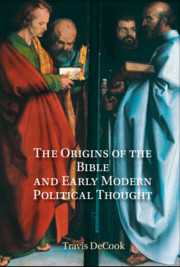 The Origins of the Bible and Early Modern Political Thought
The Origins of the Bible and Early Modern Political Thought Book contents
- The Origins of the Bible and Early Modern Political Thought
- The Origins of the Bible and Early Modern Political Thought
- Copyright page
- Dedication
- Contents
- Acknowledgments
- Introduction
- 1 The Primordial Bible
- 2 The Extrinsic Bible
- 3 Scripture Atomized
- 4 The Trial of Scripture
- 5 The Religion of the State
- Conclusion
- Bibliography
- Index
4 - The Trial of Scripture
John Milton, Individual Freedom, and the Providential Immanence of the Bible’s Textual History
Published online by Cambridge University Press: 02 March 2021
- The Origins of the Bible and Early Modern Political Thought
- The Origins of the Bible and Early Modern Political Thought
- Copyright page
- Dedication
- Contents
- Acknowledgments
- Introduction
- 1 The Primordial Bible
- 2 The Extrinsic Bible
- 3 Scripture Atomized
- 4 The Trial of Scripture
- 5 The Religion of the State
- Conclusion
- Bibliography
- Index
Summary
This chapter considers how the theological treatise De Doctrina Christiana, attributed to John Milton, portrays the Bible’s textual history in such a way as to underwrite the political agency of the Holy Spirit-filled Christian. In this work, which directly confronts the putatively corrosive findings of sixteenth- and seventeenth-century historical scholarship on the biblical text, Milton argues in strikingly unequivocal terms that the biblical text is utterly defenseless to corruption and loss in its passage through history. Paradoxically, however, he argues that this condition of total vulnerability to contingency is providentially ordained, and that it has the effect of emphasizing the preeminence of the Holy Spirit within the individual Christian over the external text. I contend that the challenges for the Christian presented by the corruption and loss of the sacred texts in Milton’s account correspond with his theological politics centered on the struggles and ultimate authority of the Spirit-guided, individual believer encountering the fallen world. This politics is given voice in his tracts Areopagitica and Of Civil Power, and most famously in his epic poem Paradise Lost.
Keywords
- Type
- Chapter
- Information
- The Origins of the Bible and Early Modern Political ThoughtRevelation and the Boundaries of Scripture, pp. 116 - 146Publisher: Cambridge University PressPrint publication year: 2021
